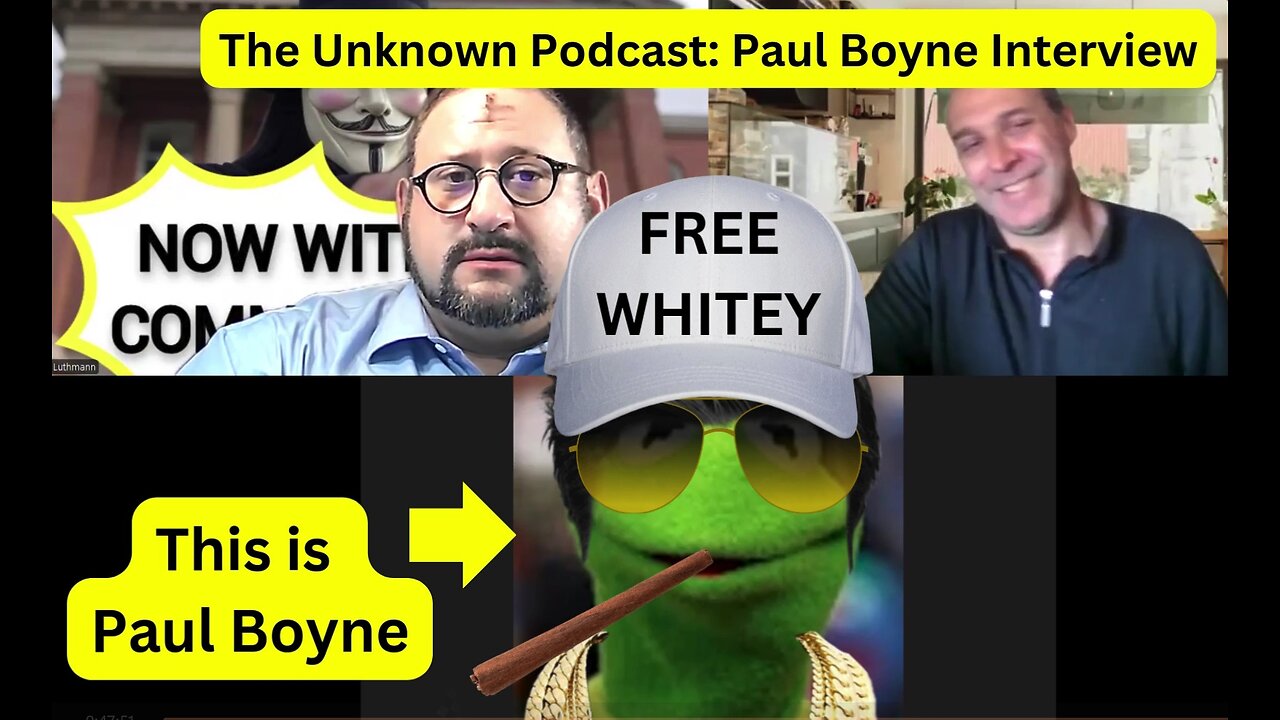Premium Only Content

Paul Boyne Speaks: Legal Battles, Free Speech, and the Weaponization of the Connecticut Courts
In Episode 29 of The Unknown Podcast, Paul Boyne joins Michael Volpe and Richard Luthmann to discuss his ongoing legal battles, the weaponization of Connecticut’s judicial system, and the broader implications for free speech in America. Boyne, a vocal critic of family court corruption, shares his experiences with judicial retaliation, unconstitutional prosecutions, and government overreach.
This explosive interview covers his indictment, his fight for First Amendment protections, and his growing legal war against the Connecticut judiciary.
The Free Speech War: Boyne’s Case and the New Hampshire Precedent
A major discussion point is a recent New Hampshire Supreme Court ruling, which struck down criminal charges against a neo-Nazi group for trespassing while displaying political banners. Luthmann argues that this ruling strengthens Boyne’s case, reinforcing that First Amendment protections must apply—even to controversial speech.
“If you don’t have specific intent or recklessness, you cannot prosecute speech.” – Richard Luthmann
Boyne, whose blog posts criticized judges and Connecticut’s family court system, sees parallels between his situation and the New Hampshire ruling. He argues that his blog content was satirical, hyperbolic, and protected under Brandenburg v. Ohio, which establishes that advocacy of violence is not a crime unless it incites imminent lawless action.
Judicial Retaliation and the Weaponization of Cyberstalking Laws
Boyne is currently facing charges under Connecticut’s cyberstalking statute, which he argues is facially unconstitutional. He explains that:
Illinois previously struck down an identical law in 2017.
Connecticut passed the same law in 2021, seemingly ignoring the precedent.
The statute lacks a clear intent requirement, making it a tool for silencing dissent.
Boyne points to evidence that his prosecution was politically motivated, citing a leaked document from Connecticut’s judiciary with handwritten notes instructing officials to "speak to Katz only"—a reference to former Connecticut Supreme Court Justice Joette Katz.
“They didn’t want a legal case. They wanted a takedown.” – Paul Boyne
The Constitutional Crisis: Boyne’s Defense Blocked by the Courts
Boyne highlights the ineffective assistance of his court-appointed attorneys, who:
Refuse to file motions on his behalf.
Ignored his requests for a Bill of Particulars to clarify the charges.
Failed to depose key judicial figures, including Joette Katz and Judge Brown.
Luthmann argues that Boyne is being systematically denied due process, and his attorneys' inaction could be grounds for an ineffective assistance of counsel claim under Strickland v. Washington.
The Financial Strain: Weaponizing Court Costs Against Defendants
Boyne explains how Connecticut is deliberately draining his resources by forcing him to:
Travel to in-person hearings in Connecticut, despite living out of state.
Spend thousands on legal fees with no trial in sight.
Endure endless court delays, ensuring he remains in legal limbo.
“They kept me in jail for 18 months, and now they’re making sure I go broke trying to defend myself.” – Paul Boyne
Final Thoughts: Fighting Back Against the System
As Boyne’s fight for free speech continues, his case raises larger questions about judicial power, censorship, and legal abuse. With no trial date set, his legal battle remains a critical test case for First Amendment protections.
-
 1:56:48
1:56:48
Tundra Tactical
4 hours ago $5.05 earnedFull Semi-Auto Comedy Hour
20.4K2 -
 2:07:31
2:07:31
The Connect: With Johnny Mitchell
13 hours ago $1.99 earnedSecrets Of The Cocaine Cowboys: Miami Drug Lord Reveals Truth About His BILLION-DOLLAR Coke Empire
16.7K1 -
 1:55:52
1:55:52
BlackDiamondGunsandGear
1 day agoGlocks Want Gun Control? // Trump Tramples on your Rights? // After Hours Armory
19.6K2 -
 1:55:52
1:55:52
DLDAfterDark
8 hours ago $0.91 earnedDLD Live! Trump - Flag Burning - Glock & Gun Control - Martial Law Light?? - After Hours Armory
12.7K1 -
 13:46:18
13:46:18
GritsGG
15 hours agoRumble Customs! 3515 Ws! 🫡!
84.8K -
 5:59:47
5:59:47
SpartakusLIVE
10 hours agoThe HUGEST Brain (not forehead) delivers Saturday SPARTOONS || Variety Later - Shadow of Mordor
186K4 -
 2:34:20
2:34:20
Barry Cunningham
11 hours agoPRESIDENT TRUMP WELCOMES FOOTBALL SEASON! AND MORE BREAKING NEWS!
80.4K51 -
 54:47
54:47
Side Scrollers Podcast
14 hours agoSide Scroller Presents KING OF THE KART | MASSIVE MARIO KART TOURNAMENT
46.8K1 -
 4:12:33
4:12:33
Mally_Mouse
14 hours ago🔥🍺Spicy HYDRATE Saturday!🍺🔥-- Let's Play: Baldur's Gate!
37.5K3 -
 2:26:32
2:26:32
BooniesHQ
10 hours agoGame Of SKATE Shaun Hover Vs. Jeff DeChesare: Boonies Skate Night 1
110K6